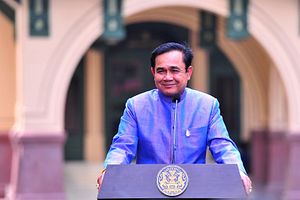When Prayut Chan-o-cha led a military coup to take over Thailand’s government five years ago, he wore a dowdy officer’s uniform. A five-year makeover transformed him into a politician, now styled in a well-tailored Western suit or an elegant silk “suea phraratchathan,” a Thai spin on the Nehru jacket.
The now-retired general, who has run Thailand with absolute power since the 2014 coup, completed his transition to a civilian leader Wednesday when Parliament chose him as prime minister of the new government.
As the leader of the junta and government for the past five years, Prayut scrapped the constitution and restricted civil liberties with limits on media, political gatherings, and public dissent. What began as a strategy to suppress resistance to the coup evolved into a means to weaken opponents before much-delayed elections. Finally held in March, the voting was conducted under campaign and vote-counting rules weighted to Prayut’s advantage, including allowing him to become prime minister without directly running for political office.
On the campaign trail, Prayut would break into song, wooing supporters with self-written saccharine ballads addressed to the nation. “Uncle Tu” even sought the youth vote, including during an awkward photo shoot at Government House with a popular all-girl pop band.
But his hallmark was not his trendiness, but rather his temper.
Thailand’s former top military officer was unused to being questioned and frequently threw tantrums when pressed by the media as prime minister. He once threatened reporters with execution in a moment that displayed his quixotic sense of humor rather than real intent.
Another time, he produced a life-size, cardboard cutout of himself and told the media, “If anyone wants to ask any questions on politics or conflicts, ask this guy. Bye, bye.” He then marched off, leaving the cardboard cutout in his place.
“He has a strong personality — vigorous and direct. If he tries to become a politician, he could try to change but he would never really be able to change 100 percent,” Supparuek Tongchairith, a veteran military beat reporter for Thai Rath, the country’s largest-circulation newspaper, said before Prayut officially became a candidate. “Because his boiling point is low, if anyone pokes at him, he will explode. And for him to sit in Parliament, I guarantee, he will run into troubles.”
Prayut’s first term in office was largely smoothed by his government’s crackdown on opponents and civic freedoms, the rubber-stamp legislature he hand-picked, a newly drafted constitution, and a law he enacted making all of his actions legal.
He can boast some accomplishments, most notably some cleanup of the aviation, fishing, and wildlife industries, and action against human trafficking.
He lent his weight to the gravity of the royal transition, marching in the procession behind the coffin of King Bhumibol Adulyadej in 2016, and attending the coronation of King Maha Vajiralongkorn in May 2019.
But his record is not unblemished. Allegations of nepotism against Prayut’s own relatives have led to uncomfortable accusations of hypocrisy for a man who pledged to end corruption as justification for the coup.
He also took no action when a close junta colleague, Prawit Wongsuwan, was embroiled in a luxury watch scandal.
Prayut, 65, was born and raised in an army family at a military camp in the northeastern province of Nakhon Ratchasima. He graduated from Chulachomklao Royal Military Academy and was already a senior figure in the army when it staged a 2006 coup against popular elected Prime Minister Thaksin Shinawatra.
In 2010, Prayut helped lead the bloody suppression of pro-Thaksin demonstrators in central Bangkok. In October that year, he became the army commander in chief.
After seizing power on May 22, 2014, Prayuth declared that political reform — cleaning up a system he blamed for Thailand’s instability — was the junta’s priority.
But as his second term as prime minister became more likely, he made allies of the very politicians he had called targets of the junta’s reforms and initiated government handouts that were once scorned as money politics.
By Grant Peck for The Associated Press.

































